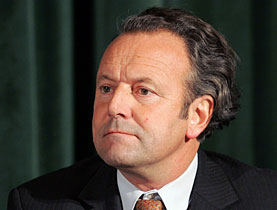
“Swiss must be creative with banking secrecy”

The decision by Switzerland to release UBS client data to the United States is legally correct, criminal law expert Mark Pieth tells swissinfo.
But following a week in which US authorities gave Switzerland’s largest bank a bloody nose at the least, Pieth believes Switzerland needs to re-think its banking system.
On Wednesday UBS paid nearly SFr1 billion ($850 million) in fines and agreed to hand over details of 250-300 customers to avert criminal proceedings relating to a tax evasion investigation.
On Thursday US tax collectors issued UBS with a civil lawsuit seeking the identities of about 52,000 US clients who allegedly kept billions of dollars at the bank to dodge the Internal Revenue Service. UBS has said it will fight the case.
swissinfo: Is this the beginning of the end for banking secrecy?
Mark Pieth: I do not believe that this will automatically result in banking secrecy being surrendered, but the Swiss authorities must think again about how to react to the demands of the US or the European Union. There is a clear tension between Swiss constitutional procedures and giving in to US pressure.
The Department of Justice had initiated criminal proceedings against UBS and the Swiss authorities obviously felt this could have serious consequences for the liquidity and existence of UBS. Under these circumstances they used extraordinary legislation; it was not emergency legislation.
The names of customers were published even though legal proceedings in the federal administrative court, which had a postponing effect, had not yet finished. The pressure from the US must have been very great.
swissinfo: Do we now have to assume that other Swiss banks will become entangled in similar procedures?
M.P.: That can’t be ruled out. What was special about the current proceedings was the involvement of UBS, the flagship of the Swiss financial centre. There would probably have been the same reaction towards Credit Suisse.
But I’m not sure that the same measures would have been taken with other banks.
swissinfo: SFr66 billion was spent to rescue UBS and now customer data has been handed over to the US. In both cases the Senate pushed its decision-making powers right to the edge. Why?
M.P.: I do not believe the two decisions are directly connected. The connection is indirect, in that the government said it involved the continued existence of UBS. That is, I believe, the common denominator.
But it is not the case that the government has taken over the leadership of UBS. This is a purely legal procedure that has been chosen by the authorities.
swissinfo: There have been several demands to reform the Swiss financial system. What does Switzerland have to do now?
M.P.: On the one side there is the issue of the rule of law and the question of when one should yield to it. On the other, the state must consider how the rules of legal aid and legal assistance, in relation to banking secrecy, should look in the future. In this respect, Switzerland would have to be a lot more creative.
One acceptable way would be a model that enabled other states to get at their tax revenues without having to reveal the names of customers in Switzerland at the same time. The withholding tax model, as it is known internationally, allows the federation to collect tax on behalf of others.
The problem is that our neighbours are being denied the means they need to maintain their welfare states. That is the point that we have to understand. I don’t really buy the argument that Switzerland should grant asylum to tax refugees because they are being pursued by high tax countries. I regard that as a very cynical interpretation.
swissinfo: The EU has demanded that Switzerland do away with its legal distinction between tax evasion and tax fraud. Does Switzerland have to comply?
M.P.: That depends on how we deal with the problem. One possibility would be that we would collect taxes on behalf of the European Union. In this case the question would change completely. If, however, we continue to operate on the basis of administrative and legal aid, this difference would be probably have to be waived.
I have fundamental doubts that it is a good business model for Swiss institutions to support foreign tax evasion.
swissinfo-interview: Andreas Keiser
People wishing to dodge paying taxes on their assets can do so by three means: avoidance, evasion and fraud.
Avoidance is the legitimate means of structuring finances so they don’t fall under the scope of taxable assets. This can be done, for example, by setting up a trust fund or by changing country residence or nationality.
Evasion is the deliberate concealing the true state of assets from the tax authorities – in other words, lying about the extent of your assets. This is a civil offence in Switzerland and some other countries, such as Austria and Liechtenstein, but criminal in most states.
The main distinction between evasion and fraud is that the perpetrator tells lies on official documentation. Unless tax fraud can be proved, Swiss banks are not obliged to hand over details of client assets to investigators. In some cases this information is needed before fraud can be established in the first place.

In compliance with the JTI standards
More: SWI swissinfo.ch certified by the Journalism Trust Initiative

























You can find an overview of ongoing debates with our journalists here . Please join us!
If you want to start a conversation about a topic raised in this article or want to report factual errors, email us at english@swissinfo.ch.